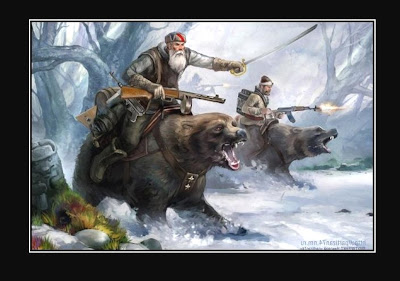Jesus H. Christ... you really went for the bears.
The council, against the voices of the more conservative tamers and the rest of the tribe, decided to focus the tribe's resources into trying to domesticate the mighty bear. Soon enough one thing became apparent: it would not happen soon, nor would it happen easily.
The first months passed with failure following failure. Often gruesome, bloody failures. We lost several too eager tamers in those first days.
The great black bears didn't just seem to care about our attempts. They saw us as food, or as a nuisance, or as a danger to be avoided.
Then winter came, and with it we learned about the long sleep habits of the beast. More months passed, and it appeared we were going to waste time, lives and effort in exchange for nothing.
Then, after more than an year of fruitless attempts, came a stroke of luck. A breakthrough. Three bear cubs, one almost white, one light brown and one, the biggest, the deepest black, were found next to the corpse of their mother. One resourceful tamer managed to gain their trust with morsels of meat, staying next to them for weeks on end, until they started following him around, even back to camp.
In the following years, a few such lucky events happened, but problems arose as well, until the idea was all but abandoned: first, the bears, once grown, showed a prodigious appetite. It became painfully apparent we wouldn't be able to feed more than an handful of them, or risk depleting our food stocks. Second, they bonded only with their own tamers. They didn't care one whit about other men, disobeyed their orders and, in an incident that became infamous, became aggressive when they felt their owner was threatened by another member of the tribe: a simple argument between one tamer and a member of the elders freed up a place in the council and caused the death of one of our few bears.
Yet from then on, the most daring of the tamers took upon themselves, as a rite of maturity, to attempt bear taming. Few succedeed, but those who did gained a stalwart companion for life.
What effective benefits it would give to the tribe as a whole was yet to be seen....
In those years though, with the initial enthusiasm for bear taming chilling somewhat, progress was made on the river-wisdom of what were once refugees and now were valuable members of the tribe on their own. Boats became a common sight in the river next to camp, and fish became a regular part of our diet.
Finally it was time to decide again where our energies would go next:
A. The eldest spoke first:
'We wasted good years on this fool's errand, trying to domesticate an animal that is too proud, too fierce to become our slave. The ways to the mountain are open, we are not afraid of the beasts lurking there anymore. We must learn more about its slopes and the resources that are hiding there.'
B. The boat masters spoke second:
'Although we agree that it's important to know more about the mountain, it's been long years since our fathers fled from their ancestral homes. We need to send stealthy boats downriver at least to the hills. Our old enemy could be moving towards us as we speak!'
C. One of the scouts, known as a daredevil, proposed:
'Why send boats downriver when we could just climb the upper reaches of the mountain and have our eyes see everything around us? Let's climb the peak and establish a permanent scouting post on top of the mountain!'
D. Finally, some scavengers hesitantly said:
'For many years now we observed the vegetation in this area. We found some edible plants, but we need to focus our energies into studying them.' 
















